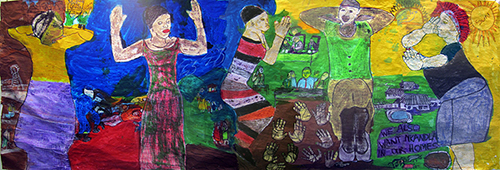Latest News Archive
Please select Category, Year, and then Month to display items
02 November 2023
|
Story Kekeletso Makau
|
Photo SUPPLIED
 The UFS Heads of Mission Breakfast event attracted a distinguished delegation of foreign diplomatic missions.
The UFS Heads of Mission Breakfast event attracted a distinguished delegation of foreign diplomatic missions.
The second Heads of Diplomatic Mission breakfast was hosted by the University of the Free State (UFS) in collaboration with the Mapungubwe Institute for Strategic Reflection (MISTRA) in Pretoria, South Africa on 26 October 2023.
The event served as an opportunity to position the UFS as a preferred partner for international collaboration in higher education, research, and innovation – following the success of the inaugural event in 2022. More than ten diplomatic missions were represented by distinguished foreign mission representatives who shared in the deliberations on this year’s theme, namely partnerships and collaborations.
The keynote address was delivered by the UFS Vice-Chancellor and Principal, Prof Francis Petersen, with contributing presentations from MISTRA researcher Laurence Caromba, UFS Professor of Pharmacology, Prof Motlalepula Matsabisa, and Senior Lecturer from the Centre for Gender and Africa Studies, Dr Grey Magaiza. A key goal of Prof Petersen’s presentation was to highlight the benefits of reciprocal collaboration and co-creation of knowledge with international partners, including industry partners. Contributing presentations posited the UFS as a partner of interest in research, innovation, and technology in the international arena and showcased the value of university and diplomatic partnerships in support of the UFS Internationalisation Strategy and Vision 130.
Caromba, a MISTRA researcher, reiterated the importance of collaboration between universities, research institutes, and the diplomatic community, further reaffirming the partnership value proposition entrenched in the UFS-MISTRA collaboration in co-hosting this year’s event. MISTRA, a renowned influential think tank, served as an excellent partner for the event.
The UFS currently boasts more than 100 vibrant international partnerships and is the incumbent coordinator of large EU-funded Erasmus+ projects among South African universities, with UFS researchers having co-authored more than 5 000 scientific publications with universities worldwide (2018-2022).
An engaging question-and-answer session concluded with insights and further action items for continued engagement post the event.
Panel to discuss: 'Speaking wounds: voices of Marikana widows through art and narrative' on Monday 27 July 2015
2015-07-24
The massacre of 34 mine workers at Marikana on 16 August 2012 had South Africans in uproar. But what remained, after the razor wire was rolled up and the camera crews left, were 34 widows engulfed in silent despair. That was until the Khulumani Support Group introduced them to the transformative power of art and storytelling. In the last installment of the Vice-Chancellor’s Lecture Series for this year, a panel of speakers will discuss these widows’ journey with the theme of ‘Speaking wounds: voices of Marikana widows through art and narrative’.
Panel
The panel will consist of members from the Khulumani Support Group that include Dr Marjorie Jobson (National Director), Nomarussia Bonase (National Organiser), and Judy Seidman (Sociologist and Graphic Artist). Nomfundo Walaza, who is the former CEO of the Desmond Tutu Peace Centre, will be the respondent.
Details of the event:
Date: Monday 27 July 2015
Time: 12:00
Venue: Chancellor's Room, Centenary Complex, Bloemfontein Campus
RSVP: Nomusa Mthethwa at Nomusam@ufs.ac.za (Members of the public are welcome to attend.)
Body maps
An art exhibition consisting of body maps created by the widows will also be on display. These paintings quietly portray the turmoil of their inner landscapes, their perceptions of the massacre, and the impact these events had on their lives.

Collaboration
The lecture series is hosted by Prof Pumla Gobodo-Madikizela, Senior Research Professor in Trauma, Forgiveness, and Reconciliation Studies at the University of the Free State (UFS), as part of a five-year research project funded by the Andrew W. Mellon Foundation. This installment of the lecture series is presented in collaboration with the UFS Institute for Reconciliation and Social Justice.